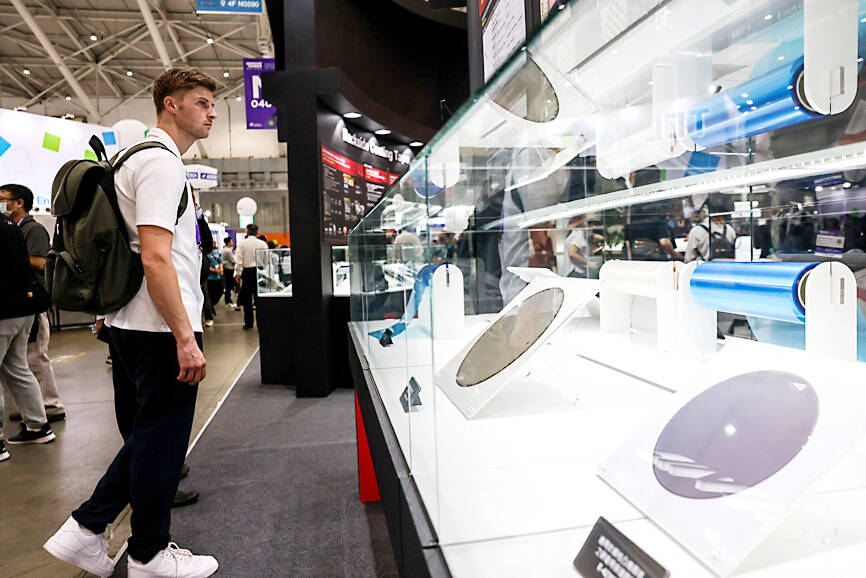The production value of Taiwan’s semiconductor industry in the third quarter rose about 9 percent from a quarter earlier, as the industry benefited from peak-season effects, the Industrial Technology Research Institute (ITRI, 工業技術研究院) said on Friday.
Output in the third quarter stood at NT$1.38 trillion (US $42.42 billion), up from NT$1.27 trillion in the second quarter, the government-funded institute said in its IEK Current Quarterly Model report.
Within the chip industry, the IC manufacturing segment recorded the best performance from July to September, with production value rising 11.1 percent from the previous quarter to NT$896.5 billion, the report showed.

Photo: I-Hwa Cheng, Bloomberg
The IC packaging service segment came in second, rising 9 percent to NT$111.4 billion, followed by IC testing service providers, which posted NT$50.5 billion, up 4.3 percent, the report showed.
The IC design segment ranked fourth, climbing 4.2 percent to NT$325.6 billion, the institute said.
The four segments of the local semiconductor industry are expected to see output grow in the fourth quarter, with output value increasing 6.9 percent sequentially to NT$1.48 trillion, it added.
This year, the local semiconductor industry is expected to post NT$5.3 trillion in production value, up 22 percent from last year, with growth in chip manufacturing, design, packaging and testing estimated to rise 27.5 percent, 16.5 percent, 8.6 percent and 5.2 percent respectively, the ITRI said.
Analysts said Taiwan Semiconductor Manufacturing Co (TSMC, 台積電), the world’s largest contract chipmaker, would serve as a driver to growth in the local IC industry this year, on the back of robust demand for its advanced 3-nanometer and 5-nanometer processes following the current boom in artificial intelligence development.
At an investors’ conference earlier last month, TSMC forecast that sales this year would grow almost 30 percent from last year in US dollar terms, up from its previous estimate of 24 to 26 percent growth.

When an apartment comes up for rent in Germany’s big cities, hundreds of prospective tenants often queue down the street to view it, but the acute shortage of affordable housing is getting scant attention ahead of today’s snap general election. “Housing is one of the main problems for people, but nobody talks about it, nobody takes it seriously,” said Andreas Ibel, president of Build Europe, an association representing housing developers. Migration and the sluggish economy top the list of voters’ concerns, but analysts say housing policy fails to break through as returns on investment take time to register, making the

‘SILVER LINING’: Although the news caused TSMC to fall on the local market, an analyst said that as tariffs are not set to go into effect until April, there is still time for negotiations US President Donald Trump on Tuesday said that he would likely impose tariffs on semiconductor, automobile and pharmaceutical imports of about 25 percent, with an announcement coming as soon as April 2 in a move that would represent a dramatic widening of the US leader’s trade war. “I probably will tell you that on April 2, but it’ll be in the neighborhood of 25 percent,” Trump told reporters at his Mar-a-Lago club when asked about his plan for auto tariffs. Asked about similar levies on pharmaceutical drugs and semiconductors, the president said that “it’ll be 25 percent and higher, and it’ll

NOT TO WORRY: Some people are concerned funds might continue moving out of the country, but the central bank said financial account outflows are not unusual in Taiwan Taiwan’s outbound investments hit a new high last year due to investments made by contract chipmaker Taiwan Semiconductor Manufacturing Co (TSMC, 台積電) and other major manufacturers to boost global expansion, the central bank said on Thursday. The net increase in outbound investments last year reached a record US$21.05 billion, while the net increase in outbound investments by Taiwanese residents reached a record US$31.98 billion, central bank data showed. Chen Fei-wen (陳斐紋), deputy director of the central bank’s Department of Economic Research, said the increase was largely due to TSMC’s efforts to expand production in the US and Japan. Investments by Vanguard International

WARNING SHOT: The US president has threatened to impose 25 percent tariffs on all imported vehicles, and similar or higher duties on pharmaceuticals and semiconductors US President Donald Trump on Wednesday suggested that a trade deal with China was “possible” — a key target in the US leader’s tariffs policy. The US in 2020 had already agreed to “a great trade deal with China” and a new deal was “possible,” Trump said. Trump said he expected Chinese President Xi Jinping (習近平) to visit the US, without giving a timeline for his trip. Trump also said that he was talking to China about TikTok, as the US seeks to broker a sale of the popular app owned by Chinese firm ByteDance Ltd (字節跳動). Trump last week said that he had